How Finland became Russian. On the eve of the Russian-Swedish war 1808 – 1809
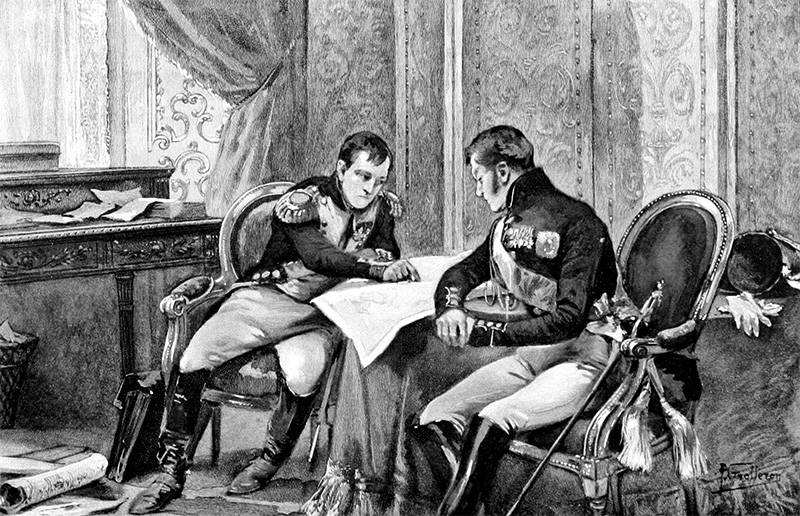
The end of the century of Enlightened absolutism was no less turbulent than its beginning. French philosophers have become trendsetters on educated monarchs, and France had to put an end to this magnificent, brilliant, bloody and merciless historical period. The 18th century began a large-scale war for the Spanish legacy, in which the aged Louis XIV defended for his descendants the right to the empty throne of the Spanish Habsburgs. The century ended with the French Revolution, the capture of the Bastille and the guillotine. Both the prologue and the epilogue turned out to be equally traced with blood, and they caused powdery burning, which lost the aromas of exquisite perfumes and bouquets of the finest wines. In a leg with a century of enlightened absolutism dressed in an expensive coat, leaning on a sharp sword, war was marching, and a silent figure with a scythe loomed beside it. And they were already preparing to meet the new century - XIX.
Napoleon and the rest of the kings. Russian-French relations
The wisdom of Empress Catherine II, the courage of the Russian army, the mistakes and blunders of the enemies, finally allowed Russia to defend its position in the Baltic and reach the Black Sea. In the wild steppes, which for many centuries were only a source of invasions of nomadic hordes, for a couple of decades cities, shipyards and fortresses grew. The region received a settled population, which not only could process it and extract resources to the treasury of the empire, but also, if necessary, protect it. A fleet has emerged in the Black Sea, capable of equal fight and defeat a numerous and experienced adversary. However, the main geopolitical task that Catherine II set herself was still not resolved. This primarily concerned the acquisition of the Black Sea straits controlled by the Ottoman Empire.
The French Revolution heavily reshuffled the political deck of Europe. Allies and opponents, neighbors and not-so-neighbors suddenly became concerned with one thought, which was spoken out loud, as “help to our royal brother Louis”. In fact, Europe already then, and even before, was cynical, attentive to its passions and indifferent to other people's sorrows. Hypocritical kings, hiding behind the bursting slogans of monarchal solidarity, were simply going to solve some of their problems (primarily economic and territorial) at the expense of France which was in the unenviable position. Europe was wrapped in whitish clubs of wars that lasted almost 25 years with small interruptions.
While the rulers of Europe did not spare gold, soldiers and gunpowder for the development and possible division of the French inheritance, Russia was preparing for the final solution of the issue with the straits. Catherine II was only verbally the inspiration and ideologist of the “rescue operation” to restore the rights of “Brother Louis”. She even threw money at some particularly zealous rescuers and rescuers: for example, the Empress gave a considerable sum of money to her recent opponent, King of Sweden, to organize an expedition to France. The wise empress would probably not have been stingy even more if the Swedish king had gone, say, to conquer Greenland. The Empress quite clearly understood that her country would not be disturbed only when the Western “partners” were enthusiastically fighting each other, and were not outraged by Russian national politics, reinforcing their indignation with the threats of war.
Unfortunately, the death of Catherine II interrupted the implementation of its geopolitical plans. Pavel Petrovich was placed on the throne, a man who was extravagant, quick-tempered and often inconsistent. However, it would be too primitive to represent Paul I only as a Gatchina cudgel and a destroyer of accomplishments of the Catherine epoch. In contrast to the deceased mother, with whom Pavel had uneasy relations, the emperor decided to put the Russian bayonet in a ruined European anthill. Numerous entourage whispered to the emperor that, they say, without Russia, the order in Europe, well, certainly did not impose anything. Needless to say, correct whispering guidelines were compiled in London and Vienna. There was something to fear: having digested the Jacobin dictatorship within itself, France emerged from its territorial shores. A series of crushing defeats of the Austrian troops in Italy, a huge Rhine army threatening the Holy Roman Empire, the landing of the expeditionary force in Egypt. And everywhere the name of the young general of the republic, Napoleon Bonaparte, was already thundering. Russia sent an army to Europe under the command of its best commander Alexander Vasilyevich Suvorov. Her best admiral Fedor Fedorovich Ushakov led a joint squadron with the Turks in the Mediterranean. However, very soon in St. Petersburg, they finally realized that they were simply blatantly used, and the Russian troops and ships were only small figures on Austrian and British military maps and political schemes.
Enraged, Paul recalled his army, quarreled with the "allies" and began to openly lean towards an alliance with France. Participation in the war in Europe was seen by Pavel as an annoying engagement in someone else's fight, where Russia's interests did not stand out at all. The emperor was already in full swing planning joint actions with the French when he suddenly died from an “apoplexy” strike as a result of an extraordinary plot. It was not a big secret that former British Ambassador Charles Whitworth was one of the key figures in the coup. Relying on growing discontent with Paul in the court and military environment, England simply directed the right people to the direction she needed. The Russian-French alliance, which had barely begun to form, dissipated - to the great relief of the enlightened navigators.
The new emperor Alexander I publicly announced that with him everything would be like under grandmother. His Majesty cunning - Catherine, despite public moaning around the French king and even sponsoring some of the most zealous "rescuers", did not send a single battalion to Europe. The young king acted differently. Numerous German relatives who were scolding at the court constantly moaned about oppression and offenses perpetrated by "mean Frenchmen." The emperor's mother Maria Feodorovna, maiden princess Maria Wortemberg Maria Dorothea, and her wife Elizaveta Alekseevna (princess Louise Badenskaya) inserted their very weighty five kopecks. They were plaintively echoed by the French royalist emigrants. And throughout this crowd, British agents deftly darted, and English gold rang. All this complex of measures sooner or later could not bring results. Russia joined the Third Anti-French Coalition. The enrolled ambitions of the young king Gustav IV of Sweden were also registered there. Both young monarchs gave birth to a thirst for military glory: Gustav decided to expand his domain in Pomerania, and Alexander hoped that military successes would overshadow his indirect participation in the plot against his father.
2 January 1805 Russia and Sweden signed a treaty of alliance, and the Swedes began some activity in Pomerania, while the main forces of the French army were directed against Russia and Austria. However, on November 20 1805, the Allies suffered a crushing defeat at Austerlitz, and already on December 14, guided by the principle of “the scalp is more expensive than gold,” Austria signed a separate Presburg Treaty with Napoleon. Here the tsar would have to stop - the French armies were located hundreds of kilometers from the borders of the empire, and thousands of Russian soldiers were actually killed for the safety of the gold of British banks and the property of numerous German relatives and friends of relatives. However, Alexander Pavlovich showed enviable obstinacy, and in 1806, a new, fourth, anti-French coalition was assembled.
Britain has traditionally been a sponsor, Russia and Prussia have deployed their armies. The Swedes again decided to try military happiness, but unlike the Russian tsar and the king of Prussia, flushed with zeal, Gustav IV took the money, but was not in a hurry to act more actively. The new coalition began to collapse at the same pace as the previous one. In a matter of weeks, the Prussian army, which had almost not become dull, was destroyed by one of the strongest Prussian army and dispersed under Jena and Auerstedt. Such a fleeting collapse turned out to be a shock for Friedrich Wilhelm III, King of Prussia.
In 1807, Napoleon won the victory at Friedland, and his troops went directly to the Neman. Alexander, despite his stubbornness, had to calm pride and go to negotiations. In the middle of the Neman, separating the two armies, a tent was set up on a large raft in which both monarchs met. Napoleon was the first to turn to Alexander with a rhetorical question: “What are we fighting for?” Of course, the answer is that so much blood was shed to protect the interests of German relatives, and even English gold, the head of a great power did not have enough spirit. As a result, Russia and France signed the Peace of Tilsit, the main conditions of which were the recognition of all French conquests and adherence to the continental blockade. Both empires pledged to help each other in foreign policy. And Napoleon did not insist on the conclusion of any military alliance between the countries - he needed strict neutrality. In exchange, the French stopped helping Turkey in the ongoing Russian-Turkish war and took a favorable position for Russia in solving its Baltic problems. The Swedish king Gustav IV, despite his participation in the anti-French coalitions with the Russians, was hostile towards St. Petersburg.
Of course, the Emperor of the French was neither an altruist nor a Russophile. In his policy, he was guided by tough and often uncompromising principles, but was by no means devoid of common sense. Napoleon was ready to give a lot for the loyalty and non-hostility of Russia, but Alexander thought otherwise in this regard. He verbally emphasized his hatred of the British and, quite possibly, even somewhere deep down was slightly sincere. But the court group of German and royalist sufferers after Tilsit was buzzing like an overturned beehive. They began to put pressure on the sovereign - it even reached anonymous letters with transparent hints about the possibility of sharing the fate of the father. Nevertheless, show Alexander more will and decisiveness, everything could be different. The chance to seize the Bosphorus and Dardanelles straits was missed. In the current situation, when France was tied up in a difficult war in Spain, Germany was in instability, and only England continued to remain invulnerable, this operation would have every chance of success. Relations with Napoleon could be secured by a marriage union, but in response to Paris’s probing, the possibility of marriage of one of Alexander’s sisters with the French emperor Yekaterina Pavlovna was immediately given in marriage, and Anna Pavlovna was considered to be very small. Finally, the straits could be helped in the expansion of French possessions in the Middle East, for example, in Egypt.
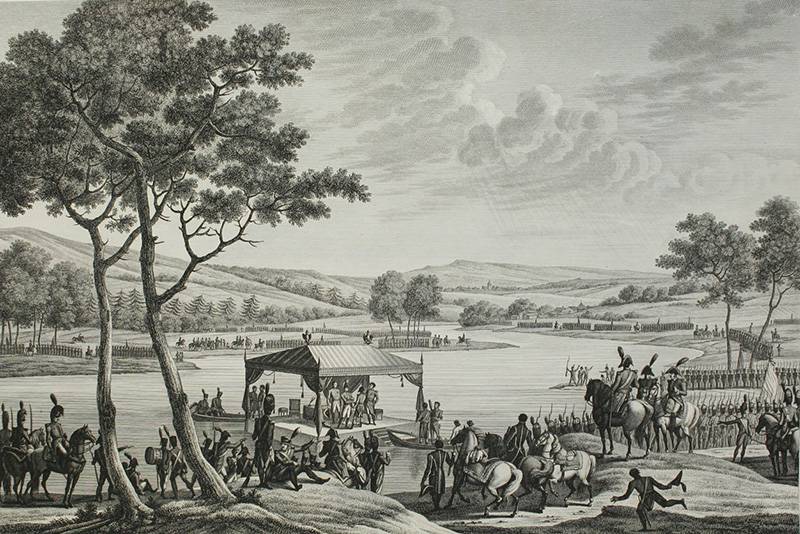
Having signed the Peace of Tilsit, Alexander continued to listen to the angry opinion of his entourage, who longed for revenge for Austerlitz. Another thing, if not for the king's stubbornness and short-sightedness, - Austerlitz simply would not exist. The daughter of the Austrian emperor Maria Louise went to the altar with Napoleon. By this time, Franz II was already rather tired of the regularly recurring attraction “our army was again defeated by the French,” and he decided that the calm of Vienna is quite comparable in value to the fate of one of his daughters. Russia did not become for France a priority friendly neutral state. England, meanwhile, did not give up, but looked for ways out of the difficult situation in which she found herself. The British Stock Exchange was in a fever from the fall of trade with the mainland, British commercial ships were regularly seized by French raiders, but the lords did not lose vigor, which, by the way, was manifested in different ways.
British Danish Campaign fleet
In late July 1807, the port of Yarmouth left the British squadron as part of the 25 battleships, 40 frigates and ships of other classes. She guarded an impressive armada from more than 300 transport ships that housed the 20-thousandth expeditionary force. The fleet did not go to the Iberian Peninsula, but to a completely different place. 1 August, British ships saw the Great Belt.
On August 8, the British ambassador to Copenhagen, Jackson, paid a visit to Danish Prince Regent Frederick, who ruled the country, since his father Christian VII was insane. The ambassador told the prince very confidentially that in London, from well-informed sources, it is well known that the villain Bonaparte is going to force neutral Denmark into an alliance against Britain, and they, the British, cannot allow it. Taking care of a peaceful country and in order to prevent such vile French perfidy, the British modestly asked to transfer under their control the entire Danish navy and, moreover, delicately asked permission to land and engage (occupy) the island of Zealand on which Copenhagen was located. History did not preserve those expressions that commented on the refusal of Prince Frederick to such an exquisitely polite ultimatum - the Danes refused.
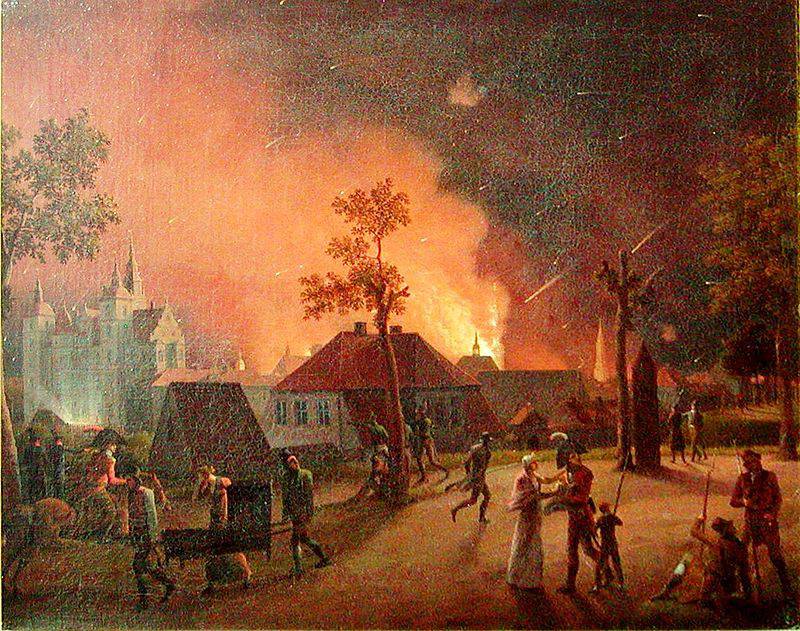
Then the British moved to a different set of measures. The English fleet, obviously full of unprecedented philanthropy, bombarded the Danish capital for several days, and a landing party was landed on the shore. The British actively used the missiles of Sir William Congreve, which caused numerous fires in Copenhagen. The victims of the shelling became more 2 thousand civilians. The city was surrounded by British troops, and the commander of the Danish garrison 72, the year-old General Peyman capitulated. The British fully expressed their concern for Denmark: the entire Danish fleet was taken to England, the unfinished and repairing ships were burned. There have also been put to the torch shipyard and naval arsenal. Furious, Frederick did not approve the surrender and ordered to give Peyman under court-martial. But this did not affect the situation. Even in England, this expedition provoked a rather ambiguous reaction — formally, this was an attack on a neutral country without declaring war.
Continental capital reacted more violently. The Russian Imperial House was related to the Danish court. In addition, Russia and Denmark in many cases acted as allies in the fight against a common enemy - Sweden. Even the disliked Napoleon Alexander could not afford such arrogant behavior of “Western partners”. England was sent a strict note in which it was immediately required to return Denmark’s fleet hijacked from it and to compensate for the losses incurred. In addition, the Russian emperor turned to the Swedish king Gustav IV with a proposal to close the Baltic Sea from warships of foreign powers on the basis of the 1780 and 1800 treaties concluded between the two countries. Stockholm refused. In November, 1807 of the year, Russia duplicated its request, however, the Swedes began to unlock and frankly pull time. Britain and Sweden continued to bind the treaty of alliance, while the Russians were always considered the enemy by the Swedes to be almost more dangerous and at the same time closer than Napoleonic France. The situation in the relations between St. Petersburg and Stockholm are well reflected and even more complicated by the fact that after the signing of the Peace of Tilsit Swedish king sent the king received from him the Order of St. Andrew - "no longer needed".
England expectedly rejected the ultimatum of Russia, ambassadors received feedback, and 20 in March 1808. Alexander I imposed a ban on the import of British goods. Thus began the sluggish Anglo-Russian war, smoldering on the expanses of the seas and oceans up to the 1812 year.
An interesting situation has developed in the Baltic. Formally, Russia and England were in a state of war, and a recent partner in the anti-French coalition, Sweden, retained trade and allied relations with the British. After Tilsit on the continent, only two countries remained expressions of British interests: Portugal and Sweden. Napoleon decided to take the first, the more so the situation in Spain was rapidly deteriorating - the amplitude of swaying the soil under the government of the pro-French Duke Manuel Godoy was increasing. In the autumn of 1807, the 25-thousandth corps of General Junot entered the territory of Spain, and in November was already at the Portuguese border.
Showing sober calculation and playing on the feelings and ambitions of Alexander Pavlovich, Napoleon began to push the Russian emperor to war against Sweden. He sent letters to the tsar with an expression of the most sincere friendship and cordiality, not forgetting, as it were, by chance to hint about the proximity to St. Petersburg of the Swedish border. Gradually, the emperor turned from hints to direct proposals, unequivocally arguing that he would not mind if Russia had seized all of Sweden, including Stockholm. About such ambitious plans of conquest, Napoleon spoke directly to the Russian ambassador in Paris, Count Tolstoy, for example, February 5 1808 of the year. The emperor was complacent and even puned about the fact that the St. Petersburg ladies would be satisfied with the solution of the Swedish question, since they would no longer hear the thunder of the Swedish cannons.
They were aware of the French efforts to direct the Russian power against Sweden in England and, naturally, used them for manipulation: they say, hold on to us, otherwise these barbarians will come. In February, 1808 Britain entered into an additional agreement with Sweden, under which it pledged to pay one million pounds sterling per month in case of a war between Sweden and Russia, no matter how long it lasts. The British became generous not only for money, but also promised to provide 14 with thousands of soldiers at Stockholm disposal to protect its western frontiers. The fact is that Norway at that time was in union with Denmark, which was opposed to England. In the event of war with Russia had a good chance its support from Denmark. There was no chance of improvement in relations between Russia and Sweden after the signing of this agreement. Everyone knew that the British simply did not invest capital, and therefore the start of hostilities was only a matter of time.
February 1 1808 years Gustav IV informed the Russian Ambassador in Stockholm that the improvement and reconciliation between the two countries is unlikely, yet in the hands of Russian in Finland are getting to them as a result of previous wars. Alexander I, who is already completely fed up with the hostile position of the Swedes, nurtured by enlightened navigators, responded to this statement by declaring war.
Baltic Fleet on the eve of the war. Lisbon incident
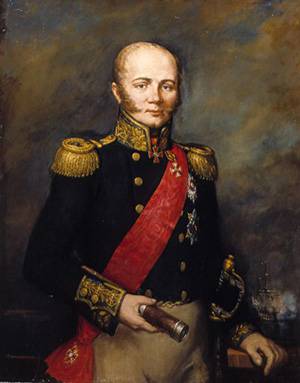
Moment for the start of the conflict was not very favorable for Russia on a number of factors. In this period of time the empire was at war with the Ottoman Porte, and although at the beginning of the conflict with Sweden is not the fighting took place in the framework of the concluded Slobodzeya truce in the south was a large contingent of Russian troops. In addition, in the Caucasus, the war continued with Persia, which, however, was waged with limited forces. Spring 1809 was fighting with the Turks were resumed, and Russia, as well as during the events 1788-1790 years., It turned out to be a party of two, and if you count the Persian war, even three conflicts. The situation with the balance of power at sea was not in favor of the Russian Empire. By the beginning of hostilities, the best and most efficient core of the Baltic Fleet was located in the Mediterranean, where it was sent as part of the Second Archipelago Expedition. The command of the Russian squadron in this enterprise was carried out by Admiral Dmitry Nikolaevich Senyavin. The accumulation of power in the Mediterranean was carried out gradually: in October 1804, the vanguard of the expedition went there under the command of Aleksey Greig Samuilovich of two battleships and two frigates. In September, 1805 went to Senyavin himself, with 5 battleships and one frigate. In addition to these connections, Ignatov’s squadron went to the south of 1806 in August: 5 battleships, 1 frigate and several small ships.
Russian naval operations against Turkey in general have been very successful. On the island of Tenedos, an operational base was equipped, as a result of a well-organized naval blockade, food supplies to Istanbul were stopped, and famine began in the Ottoman capital. The Turkish fleet was defeated in the battles of Athos and Dardanelles. However, the signing of the Peace of Tilsit and the beginning of a truce with the Turks reduced all successful actions of Senyavin’s squadron to zero. Forced to return Tenedos to the Turks, and to abolish the Russian Union Republic of the Seven Islands and transfer control to the French, the Russian squadron began returning home with several detachments.
During the relocation took place the so-called Lisbon incident, in which you need to stop in order to understand why the Baltic Fleet to the beginning of the war with Sweden not replenished returning from the Mediterranean ships. Senyavin, having under the command of the 10 battleships and the 3 frigate, was returning to the Baltic and on October 28 1807 arrived in Lisbon. The admiral was warned about a possible war with England and the need to avoid meetings with the British fleet whenever possible. Having arrived in the capital of Portugal, the Russian ships were in a very difficult situation. While the squadron was making scheduled repairs and replenishing supplies, October 30 Lisbon was blocked from the sea by a British squadron whose intentions were not in doubt. 18 November the city was occupied by French troops of General Junot, and Senyavin caught between a rock and a hard place. Numerous instructions from St. Petersburg poured oil on the fire, because, being thousands of kilometers away from the scene of events, for some reason they believed that it was the Russian commander who had to do it. The matter has already reached the letters from Alexander himself, in which he demanded from Senyavin maximum assistance to the French command.
As an opponent of friendship with Napoleon, and not hiding their relationship to a humiliating, in his opinion, the Treaty of Tilsit, the admiral was able to show remarkable restraint and diplomatic talent. Despite all the admonitions of the French, he did not go on about them, although Emperor Alexander demanded that the admiral carry out Napoleon’s orders, as if they were coming from the king himself. All the instructions and wishes of the French by Senyavin were simply ignored to one degree or another, and attempts to integrate the Russian squadron into the Napoleonic Atlantic forces ended in nothing.
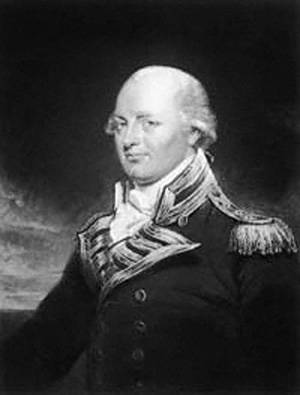
18 August 1808 The city of Lisbon was already occupied by British troops. The English commander, Vice Admiral Cotton, had clear instructions from the Lords of the Admiralty, according to which the capture of the Russian squadron in Lisbon would be highly desirable. To support the land operation, additional troops were sent to Lisbon by Generals Moore and Spencer. The English commander, like his Russian counterpart, was able to go beyond the instructions and, clearly realizing that the Russians would not surrender, he went to the negotiations with Senyavin. Russian admiral looked soberly at the situation: the ships of the squadron were entrusted to him by this time in very poor condition, and attempt to get out of the river Tagus, where there was a squadron in order to break with the battle would have very little chance of success. The British had 13 battleships, 11 frigates, half a dozen smaller ships near Lisbon. All of their fighting units were fully operational.
The simplest approach, of course, saw the execution of Admiral Chichagova instructions received by February 10 1808 years. According to her, in the case of hostile actions on the part of superior British forces or the threat of seizure, it was ordered to bring the crew ashore and burn the ships themselves. However Senyavin not go on about the rescripts and guidance, and chose the difficult path of diplomacy. 4 September 1808 between the two commanders signed a special convention, according to which Russian ships leave for England, where they will stay until the signing of a peace treaty between Russia and England.
September 12 squadron under the flag of St. Andrew's left Lisbon, accompanied by an English squadron and September 27 arrived at the Portsmouth raid. The fact that the Russian ships remained under their flags, and did not become, as was supposed, the property of Britain, caused noticeable discontent in England. Vice Admiral Cotton, because he dared to negotiate with Senyavin, and did not take military action against him, was strongly criticized. The case was heard in Parliament.
During the stay of the Russian squadron at Portsmouth there was a curious case. The English king asked Senyavin, since both countries were in a state of war, not to hoist above the ships of St. Andrew’s flags. The admiral replied to the King’s letter that out of respect for His Majesty, he would fulfill his request, and the flags on the squadron would be lowered at the usual time, according to the statute. But the British were stubborn - on board the Russian flagship Admiral Montagu arrived and in an arrogant form began to demand the immediate descent of the flags. Senyavin, showing ordinary firmness, replied that they were not prisoners, and the flags would be lowered strictly according to the rules. But if the British gentlemen want an immediate procedure, then they can only get Russian flags along with the lives of Russian sailors. Realizing that Senyavin, despite the critical situation, is ready to take his last battle even on the Portsmouth roadstead, Admiral Montague considered it good to take back his demands and retire. This act Senyavina earned respect in the British military and social environment.
5 August 1809, the crew left England and a month later arrived in Riga on transport ships. During the time they were in Portsmouth, the teams did not go ashore, and even Senyavin, who had all the opportunities for this, did not leave his subordinates. He even refused the offer of the English king to visit London. In the homeland of the Admiral suffered undeserved disgrace. In 1812, the British returned the ships to the ownership of Russia, and for those that came to total disrepair, compensation was paid.
Thus, by the beginning of the war with Sweden, the Russian Baltic Fleet had in Kronstadt and Revel 9 battleships, 7 frigates and 25 smaller ships. The rowing fleet had 11 floating batteries and 115 gunboats. Part of the large ship was in poor condition. So for the Baltic Fleet the Russian-Swedish war of 1808 – 1809 began.
To be continued.
Information